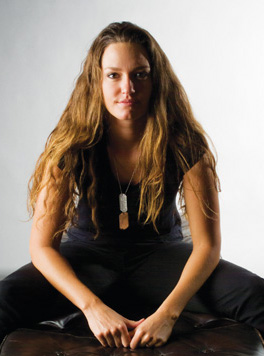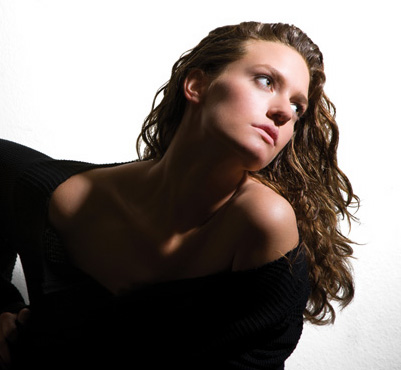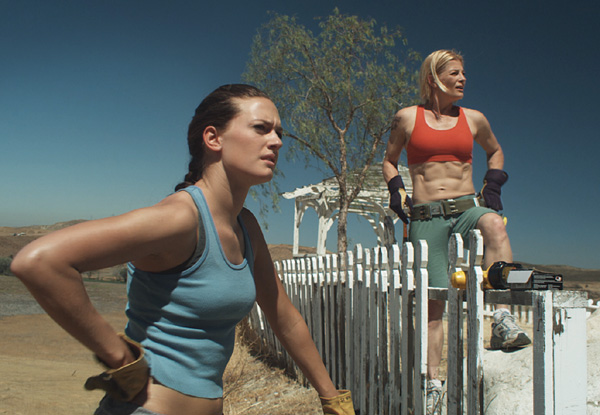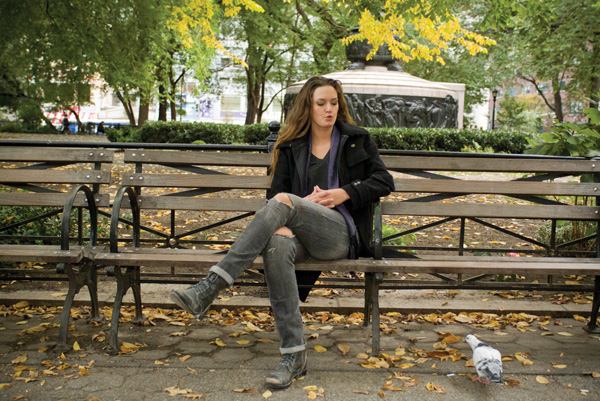Accomplished actor, writer and producer Paris Pickard seemed destined for a cinematic life from the very beginning: her parents visited the French capital, experienced the romance of Europe and drank their favorite wine—nine months later, Paris and her fraternal twin sister Chardonnay were born.
In her hometown of Syracuse, New York, Paris acted in and directed plays at Fayetteville Manlius High School while Chardonnay acted under the direction of her taller sister. Paris’ favorite class was broadcast journalism, where she read the morning school TV announcements and did other TV work–both in front of and behind the camera.
A tomboy through and through, Paris played catcher on her high school’s boy’s baseball team. She was a straight-A student who also played tennis, loved snowboarding and participated in a host of other sports.
As a teenager, Pickard spent time in New York, Spain and the Netherlands. She showed an early interest in drama, dipping into Shakespeare and the ancient Greeks before obtaining her BFA in film directing at Emerson College in Boston.
While at Emerson, Pickard founded her own film production company, P3 Productions. Her thesis film, the experimental short The Storm, has won accolades at LGBT film festivals around the country. The Storm is a twist on the Siren’s Song in The Oddssey. Using all female actors singing to a female protagonist, Pickard says the film is about weathering the storm, both literally and figuratively: coming out, coming into oneself and knowin it will be okay.
Pickard’s TV and film experience includes a stint as a PA on Queer Eye, a gig secured through a family friend; Paris also worked with photographer/director David LaChapelle, and, after moving to Los Angeles, assisted on the films Angels and Demons and Frost/Nixon.
Currently working in the art department at SONY Pictures Studio in L.A., Pickard’s day job supports her independent endeavors and complements her other involvement in the film industry.
In A Marine Story, Pickard stars as Saffron, a troubled teen in a small town who’s given the choice of jail or boot camp. (She chooses boot camp.) There she meets a female marine, played by Dreya Weber, driven out of the service under the “Don’t Ask, Don’t Tell” policy.
Starring in and co-producing A Marine Story is a blend of just two of Pickard’s interests, as GO found out when the multi-faceted artist sat down for an exclusive interview. She talked to us about girls, film and fun, not necessaily in that order.
GO: The “Don’t Ask, Don’t Tell” policy figures prominently in A Marine Story. What do you think about DADT—both personally and as it relates to the film?
PP: Well, my personal hands-on involvement in LGBT rights has really been with Prop. 8. Going to rallies, handing out flyers and talking to people in the community was certainly an eye-opener. The character of Saffron is a sort of portrait of many people I know. My personal experience in the lesbian and gay community influenced the personal aspect of the DADT issue, of course. We’re all people with unique stories both past and present.
Were you ever concerned that you would be typecast as a lesbian actor who could only play lesbians?
Well, I don’t portray a lesbian in A Marine Story, although the film is centered on a lesbian theme. In fact, that’s never been my concern because my acting is secondary to directing and producing. I don’t worry about being characterized as a gay actor forever because I am talented enough to play intelligent, meaty and thoughtful roles, regardless of my sexuality.
You’re a writer, director, producer, actor and model. With what role do identify the most?
I like working in all aspects of film, but if I have to narrow it down, I’d say I’m a director, producer and screenwriter who acts. I’d love to do more acting, though, because it informs my directing just as directing informs my acting and working in production helps with it all. I’ve developed a deeper understanding of the craft and view it from different perspectives. I like to be versatile.
How did you get involved with A Marine Story?
I was working in production in L.A. during the writer’s strike, and when it looked like it was going to be a long, drawn-out fight with the studios, I began modeling and auditioning for acting jobs and commercials. Through networking, I met a mutual friend of Dreya’s [co-star and producer Dreya Weber] and Ned’s [writer/director/ editor Ned Farr], who invited me to audition for the film. They called me the next day to tell me I had the part. A year later we shot A Marine Story.
Time for the inevitable question. When did you first realize you were a lesbian?
I’d say around age five, but I didn’t really understand I was gay until I was 18. I somehow “forgot” about it after age 5 and assumed I was just like all the other girls. But then I met out lesbians in college and I was very friendly with a lot of gay men, too. And, I was passionate about stamping out homophobia; I knew that it was wrong to hate gays. I always root for the underdog and to my mind, even though I didn’t yet identify as a lesbian, I knew homophobia was bad. And we now know better than ever, with the recent series of gay teen suicides, that homophobia kills.
Do you believe that as an out lesbian in entertainment you have a responsibility to be a spokesperson or role model for the community?
I certainly think there is some responsibility; just being visible is important, of course. I could never not be out, because it’s such a big part of who I am. If I were not open, which came about organically, I just wouldn’t be me.
In broader terms, I believe people have to feel comfortable with themselves first; and second, feel safe coming out into the public arena. It’s each individual’s choice to do come out –or not– in his or her own time. I don’t think it should be forced. No one should be forced out of the closet.
How and when did you come out?
It wasn’t something I made a totally conscious decision about. During pre-production of A Marine Story, I had long talks with producer JD Disalvatore about whether or not to be out publically. Because of these conversations, I thought it would be extremely uncomfortable to pretend I’m straight. I mean, people in L.A. already know I’m a lesbian, they see me with my girlfriend all the time. Disalvatore makes herself known, so she knows how it is to be out in Hollywood. We were planning to promote the film with me as an out lesbian—both for the film and for the press because there are not very many out lesbians acting today. JD was very encouraging and I was, from the very beginning, not at all opposed to it. I believe it is very important to be visible. I mean, half of Hollywood is gay and it’s really a huge missed opportunity for those in the industry to influence the perception about LGBT people in this country—and around the world.
Is Hollywood moving away from the long-held belief that coming out is a career killer? How do you think being out will affect your career?
It’s not something I’m worried about. I’m really behind the scenes most of the time. I’m more in the writer/director/filmmaker mode. With Dreya’s personal and professional interest in portraying lesbian characters –and her often being typecast as a lesbian– that has really helped her career. For me, it’s a little bit more risky because I actually am gay and she is not.
Some Hollywood actors try hard to control their image. As your fame and profile grow, how do you plan to present yourself?
I went through a sort of mini-change when I came out. I felt I needed to highlight the lesbian part of my personality, so I started dressing more boyishly and cut my hair short. I would go to nightclubs during college where “looking the part” definitely got more girls interested. Gradually I transformed back into how I used to be and as I am now.
I realized I never need to try to be more masculine for the lesbian community or more feminine for the straight community—it truly doesn’t matter, I’m just myself. I used to believe I had to go out in heels and a dress to get into clubs and events when I lived in New York, just to keep up a certain appearance to please the public. As I moved away from that idea, people really didn’t seem to care—and that was a revelation to me. It was another important part of my coming out process; a coming into my own. I decided right then that I would just be myself, and I saw how silly it was to be putting on a façade for other people.
A Marine Story opens in New York this week . What’s next on your to-do list?
I’m working on a film, Amongst the Birds and Bees, based on a short story by my mother and I’m writing another screenplay for a feature film. But mostly, right now I’m promoting A Marine Story.





What Do You Think?